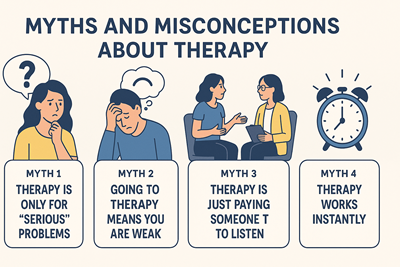 Myths and Misconceptions
Myths and Misconceptions
About Therapy
Therapy is a valuable resource for improving mental health, yet many people hesitate to seek it because of myths and misconceptions. Misunderstandings about what therapy is and how it works can create stigma, fear, or unrealistic expectations. By addressing these misconceptions, we can encourage more people to view therapy as a positive and empowering step toward well-being.
Myth 1: Therapy is Only for “Serious” Problems
One common misconception is that therapy is only for individuals with severe mental illness. In reality, therapy can benefit anyone. People seek therapy for a wide range of reasons—stress management, relationship challenges, personal growth, career struggles, or simply needing a safe space to talk. Therapy is not just about crisis—it’s also about building resilience and improving quality of life.
Myth 2: Going to Therapy Means You Are Weak
Many people fear that seeking therapy is a sign of weakness or failure. On the contrary, reaching out for support takes courage. Just as visiting a doctor for physical health is a sign of responsibility, going to therapy shows a commitment to taking care of your emotional and mental health. Strength lies in acknowledging struggles and choosing to address them.
Myth 3: Therapy is Just Paying Someone to Listen
Another misconception is that therapy is no different from talking to a friend. While friends can provide comfort, therapists are trained professionals who use evidence-based techniques to help clients gain insight, challenge unhelpful patterns, and develop new coping strategies. Therapy provides guidance that goes beyond casual conversation.
Myth 4: Therapy Works Instantly
Some expect therapy to provide quick fixes after one or two sessions. In reality, progress takes time. Healing and growth are gradual processes that require consistency, effort, and trust in the therapeutic relationship. While small changes can happen quickly, long-term improvement often develops over weeks or months.
Myth 5: Therapists Will Judge or Tell You What to Do
Many fear being judged or criticized in therapy. In truth, therapists provide a nonjudgmental, confidential space where clients can explore their feelings openly. Therapists don’t dictate life choices; instead, they guide clients toward self-discovery and help them make decisions aligned with their own values and goals.
Therapy is surrounded by misconceptions that can prevent people from seeking the support they need. It is not only for severe problems, nor does it signify weakness. Therapy is a collaborative process that requires patience but offers meaningful tools for personal growth and healing. By dispelling these myths, we can reduce stigma and encourage more people to view therapy as a proactive and empowering step toward better mental health.
This is a great article from ChoosingTherapy.com on getting started on the process of seeking therapy.
How to Start Therapy: 9 Tips & What to Expect

 Myths and Misconceptions
Myths and Misconceptions